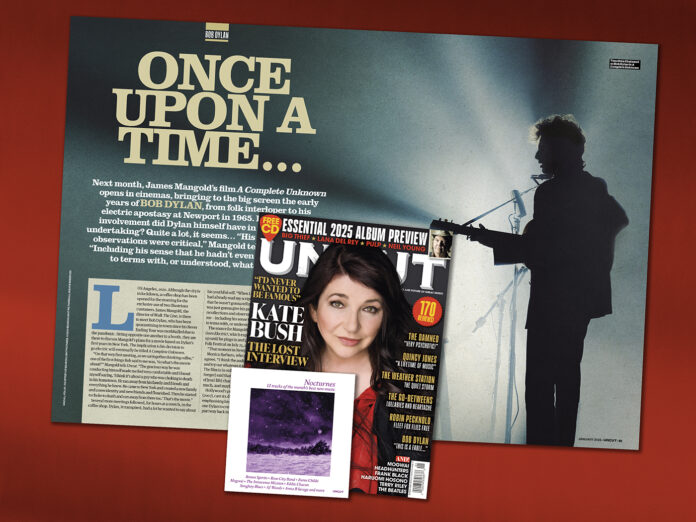Next month, James Mangold’s film A Complete Unknown opens in cinemas, bringing to the big screen the early years of BOB DYLAN, from folk interloper to his electric apostasy at Newport in 1965. In this extract from from Uncut's January 2025 issue, we discover how much involvement Dylan himself had in this cinematic undertaking..
Next month, James Mangold’s film A Complete Unknown opens in cinemas, bringing to the big screen the early years of BOB DYLAN, from folk interloper to his electric apostasy at Newport in 1965. In this extract from from Uncut’s January 2025 issue, we discover how much involvement Dylan himself had in this cinematic undertaking..
CLICK HERE TO READ UNCUT’S REVIEW OF A COMPLETE UNKNOWN
LOS Angeles, 2020. Although the city is in lockdown, a coffee shop has been opened for the morning for the exclusive use of two illustrious customers. James Mangold, the director of Walk The Line, is there to meet Bob Dylan, who has been quarantining in town since his Never Ending Tour was mothballed due to the pandemic. Sitting opposite one another in a booth, they are there to discuss Mangold’s plans for a movie based on Dylan’s first years in New York. The implication is his decision to go electric will eventually be titled A Complete Unknown.
“On that very first meeting, as we sat together drinking coffee, one of the first things Bob said to me was, ‘So what’s this movie about?’” Mangold tells Uncut. “The gracious way he was conducting himself made me feel very comfortable and I found myself saying, ‘I think it’s about a guy who was choking to death in his hometown. He ran away from his family and friends and everything he knew. He came to New York and created a new family and a new identity and new friends and flourished. Then he started to choke to death and ran away from there too.’ That’s the movie.”
Several more meetings followed, for hours at a stretch, in the coffee shop. Dylan, it transpired, had a lot he wanted to say about his youthful self. “When I sat down with Bob the first time, he had already read my script,” continues Mangold. “He said to me that he wasn’t gonna tell me what I could and couldn’t do. He was just gonna give his perspective on what went down. His recollections and observations about that period were critical to me – including his sense that he hadn’t even come completely to terms with, or understood, what happened.”
The source for Mangold’s film is Elijah Wald’s 2015 book Dylan Goes Electric!, which explores Dylan’s milieu from 1961 to 1965, up until he plugs in and plays “Maggie’s Farm” at the Newport Folk Festival on July 25, 1965.
“That moment in Newport really is cinematic,” Wald tells Uncut. Monica Barbaro, who plays Joan Baez in A Complete Unknown, agrees. “I think the audience will be rooting for him to go electric and try out whatever it is that’s making his hair stand on end. The film is in order, event-wise, but Ed Norton [who plays Pete Seeger] said that it had a kaleidoscopic effect with our large cast of [real-life] characters. This could be a limited series – we shot so much, and maybe there’s a four-hour version somewhere.”
Hollywood’s previous Dylan biopic, Todd Haynes’ I’m Not There (2007), cast six different actors to play ‘aspects’ of Bob, emphasising his mercurial, shifting mystery. Mangold only has one Dylan to contend with here – Timothée Chalamet, given the part way back in 2018 following his star-making turn in Call Me By Your Name. Accordingly, Mangold has tried to find the flesh-and-blood reality of a Minnesotan kid blowing into MacDougal Street, trailing tall tales as he makes his way to Newport ’65.
“I’m out to understand these people as thinking, feeling humans who were making choices about what they sang or who they dated in the same random way any 21-year-old might,” Mangold says. “I love the idea of looking at people who have had such a profound cultural effect when they weren’t iconic and no one knew what was gonna happen. The perception of Bob Dylan is the guy in the flare of spotlights with the curly hair and the Ray-Bans, but the transformation into that is the end of our picture. The movie is exceptionally sweet because there’s such innocence about these characters before all their moves are worth money and every song they sing outrages or pleases so many.”
Chalamet’s own perspective on the project is perhaps more akin to the enigma he plays. “This is interpretive,” he recently explained to Apple Music. “This is not definitive… this is not how it happened. This is a fable.”



